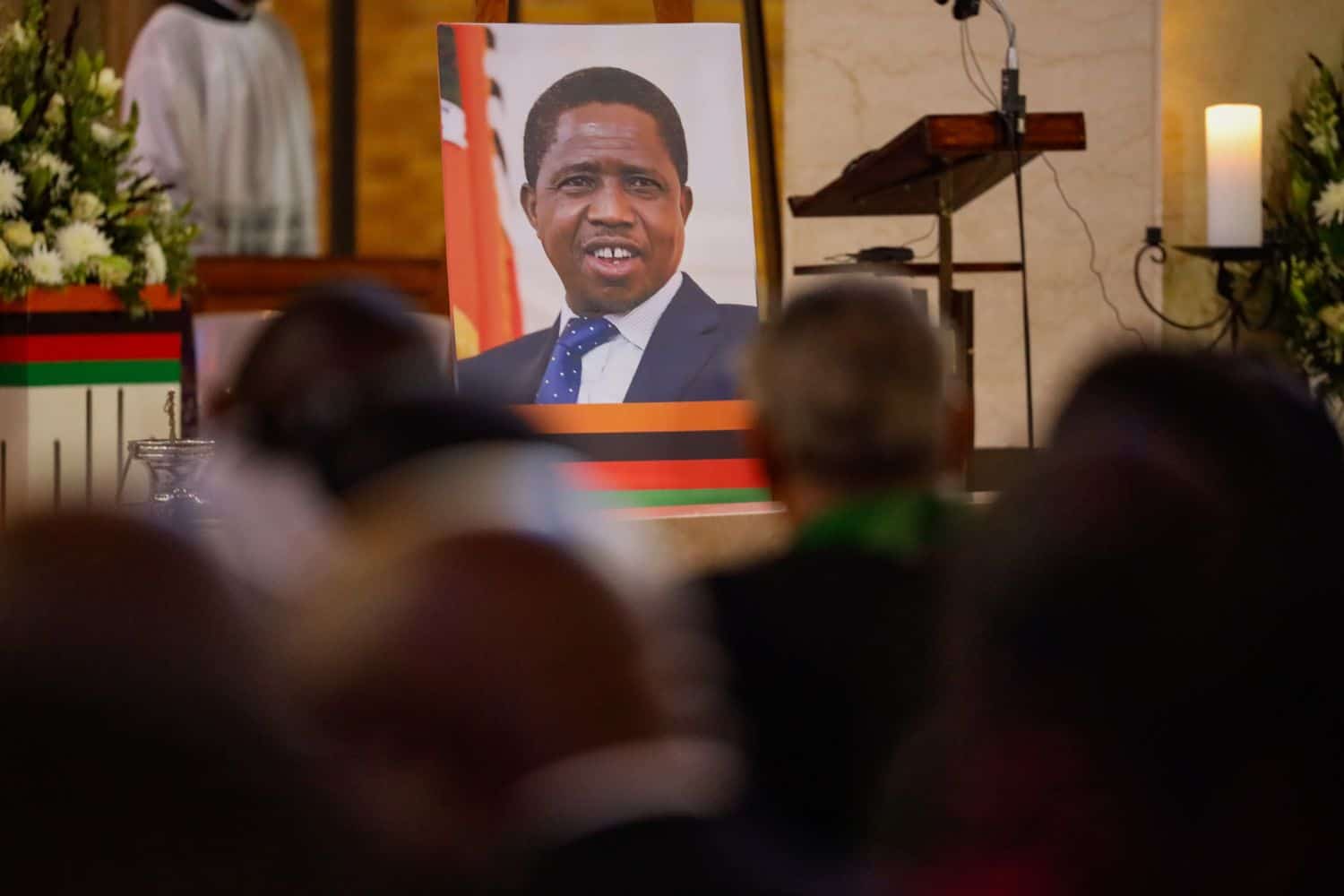The court heard the former Zambian president had died without his presidential benefits.

The Gauteng High Court in Pretoria has heard that the widow of late Zambian president Edgar Lungu holds the legal right to decide where her husband should be buried.
On Monday the court considered a leave to appeal application brought by Lungu’s family who are locked in a legal dispute with the Zambian government over his final resting place.
Edgar Lungu’s family vs Zambian government
Lungu died on 5 June at the age of 68 while receiving medical treatment in Pretoria.
Following his death, the Zambian government offered to repatriate his remains for a state funeral.
However, the family rejected this offer, saying Lungu had instructed that President Hakainde Hichilema should not come near his body.
Although an agreement was eventually reached to hold a state funeral in Zambia, the family accused the government of breaching the terms of the agreement.
ALSO READ: SA court rules ex-Zambian president Lungu to be buried in Zambia
On 20 June, they announced that the burial would instead take place in South Africa.
Just days later, on 25 June, the high court suspended the planned burial.
The court then ruled on 8 August that Lungu’s body should be returned to Zambia for a state funeral, finding that there was a binding agreement between the family and the government.
The family immediately launched an appeal.
Edgar Lungu’s arguments
Advocate Tembeka Ngcukaitobi, representing the family, argued that the appeal would have strong prospects of success in the Supreme Court of Appeal (SCA) and raised issues of public interest.
“I simply have to persuade the court that there is at least a reasonable prospect that this case can be decided differently,” he said.
Ngcukaitobi maintained that human remains are not subject to binding agreements and that the widow had the authority to decide on burial arrangements.
“Basically, the law is this. You don’t contract over human remains. A corpse is dead.
“It’s not a property. It cannot be contracted over,” Ngcukaitobi said.
READ MORE: Court halts Lungu’s funeral in SA after challenge by Zambian government
“What you do, you follow the law of succession. If there’s a will, you follow the will. If there’s no will, the law of interstate succession applies.
“So if you are dead and you are a husband, your remaining wife takes the decision. If the wife is also deceased or incapable of taking the decision, the children make the decision.
“If the children are incapable, the parents take the decision. If the parents are incapable, your siblings take the decision,” he said.
South African law vs Zambia law
The lawyer further argued that South African law should apply since Lungu’s widow was bringing the case in a South African court.
“Mrs Lungu is in South Africa, she is suing in a South African court [and] she is relying on the South African constitution for protection,” Ngcukaitobi said.
He warned against allowing foreign law to override constitutional rights in South Africa.
“What you cannot have is a foreign state coming to our courts, demanding the application of a foreign law in order to deny someone who is in our jurisdiction the rights that are protected by our constitution.
“That substantially weakens the protections in our constitution.”
READ MORE: Finally coming home to SA: Who are the struggle heroes to be repatriated from Zambia, Zimbabwe?
Ngcukaitobi further argued that Zambian law had no “extraterritorial” effect.
“It applies in Zambia, not here.”
He also said that Lungu had died without his presidential benefits, which could not be restored posthumously.
“You cannot reinstate benefits on a corpse. The legal position is preserved as at the time of death.
“The legal position as at the time of death is that Mr Lungu had lost his presidential benefits. He lost the benefits that came with being the president of the country.”
Watch the case below:
Ngcukaitobi emphasised that the decision should rest with Lungu’s widow.
“You cannot say a corpse has a right to be buried. A corpse has no rights, a corpse is not a legal thing.
“If the benefits are removed, those benefits are removed on a living thing, on a living organ. Once life ends, the rights also end.
“So what they have now tried to do is a very artificial thing, which is to reinstate rights on a corpse.”
Zambian government’s position
Meanwhile, the legal representative of the Zambian government, attorney-general Mulilo Kabesha, argued that Lungu was not domiciled in South Africa.
“He was only temporarily present here and he was a person of national significance,” he said, adding that these factors should determine which law applies.
The lawyer maintained that the high court had correctly ruled that Zambian law should govern burial rights.
He further argued that the dispute was not about the corpse itself but about the right of burial.
“That’s what the parties contracted about and that’s also what Zambian law is concerned with.”
The government’s lawyer added that no other court would reasonably reach a different conclusion even if South African law were to apply.
Judgment was reserved.
Support Local Journalism
Add The Citizen as a Preferred Source on Google and follow us on Google News to see more of our trusted reporting in Google News and Top Stories.








